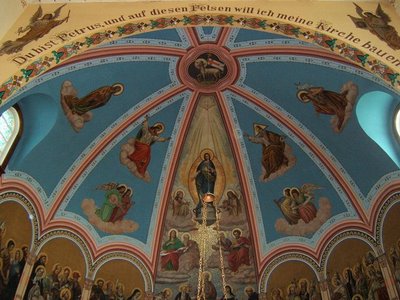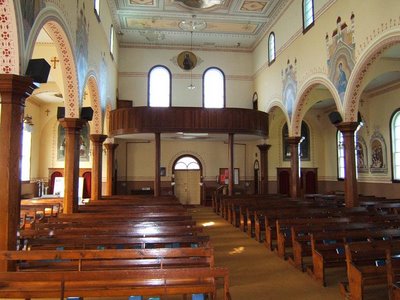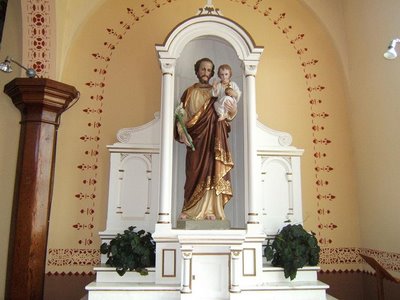The personal blog of James Kautz: a regular guy who is just trying to sanctify the tyranny of self-improvement.
Sunday, July 30, 2006
Poor, sorry Britain.
That percentage reflects the number of babies aborted (at least 187,499) in Britain & Wales in 2005.
British women had 645,835 live births last year - amounting to a 1.8 Total Fertility Rate per woman (TFR). Basic demographics state that for a nation's population to grow, the TFR needs to be 2.1.
When you add the number of abortions, the TFR was actually 2.3 children per woman. But abortion is kinking the hose of British population growth. Except for the Muslims.
I sure hope the Superman wasn't among those aborted.
Saturday, July 29, 2006
Here's a copy of a talk I gave at a recent Wednesday night prayer meeting. I'm one man's voice in a storm of yelling, so take my comments herein accordingly.
The conflict in the Middle East is as old as Abraham. In Genesis 16 we are told the story of Abram (soon to become known as Abraham) and his wife's maidservant, Hagar. Sarai, Abram's wife, was barren, and so she asked Abram to have children with Hagar – rather like a surrogate mother. When Hagar became pregnant, she “looked on her mistress with disdain.” I would tend to think this was because she didn't want to give her child to Sarai.
Then Sarai blamed Abram for the tension between her and Hagar, and [read Gn 16:6-12)
Abram told Sarai: "Your maid is in your power. Do to her whatever you please." Sarai then abused her so much that Hagar ran away from her. The LORD'S messenger found her by a spring in the wilderness, the spring on the road to Shur, and he asked, "Hagar, maid of Sarai, where have you come from and where are you going?" She answered, "I am running away from my mistress, Sarai." But the LORD'S messenger told her: "Go back to your mistress and submit to her abusive treatment. I will make your descendants so numerous," added the LORD'S messenger, "that they will be too many to count. Besides," the LORD'S messenger said to her: "You are now pregnant and shall bear a son; you shall name him Ishmael, For the LORD has heard you, God has answered you. He shall be a wild ass of a man, his hand against everyone, and everyone's hand against him; In opposition to all his kin shall he encamp."
Fourteen years later, Abram and Sarai, now known as Abraham and Sarah, were promised a son of their own. Abraham, amused at the concept of being a father at one hundred years old:
Then Abraham said to God, "Let but Ishmael live on by your favor!" God replied: "Nevertheless, your wife Sarah is to bear you a son, and you shall call him Isaac. I will maintain my covenant with him as an everlasting pact, to be his God and the God of his descendants after him. As for Ishmael, I am heeding you: I hereby bless him. I will make him fertile and will multiply him exceedingly. He shall become the father of twelve chieftains, and I will make of him a great nation. But my covenant I will maintain with Isaac, whom Sarah shall bear to you by this time next year."
Their son Isaac became the father of Jacob - and God changed Jacob's name to Israel. The twelve tribes of ancient Israel were descendants of Jacob's twelve sons.
There is much dispute whether modern-day Arabs are the descendants of Ishmael, but Muslims themselves do believe they are. So you can understand why there is so much hatred between these ancient brothers.
It would take hours to summarize the Arab-Israeli conflict, as much has happened since the formation of the Jewish state in 1948. So I will try to give a brief overview, as it's important to understand the historical context of the current conflict.
Britain had control of Palestine, but was finding it increasingly difficult to keep the peace between the increasing numbers of Jewish settlers and local Muslims. In 1947 Britain gave up, and surrendered control of Palestine to the newly formed United Nations. The following year, on May 14, the state of Israel was officially proclaimed.
Egypt, Syria, Jordan, Lebanon, and Iraq all sent troops to fight against the new state. Israel defended itself quite ably against such a massive enemy. Canada has a connection to this conflict as well; George “Buzz” Beurling was our top fighter pilot from World War II with 32 aircraft downed, and he didn't take to peacetime well, being reduced to begging on the streets of Montreal. He accepted an invitation from the Israelis to come fly in their Air Force, but died en route to the conflict.
In 1949 a cease-fire was declared, and Israel had gained some territory and had lost some – most notably the areas now known as the West Bank and the Gaza Strip.
In 1967 conflict erupted again – the famous Six Day War – during which Israel captured much territory from Syria, Jordan, and Egypt, but gave much of it back in the years to follow as new peace treaties were signed.
In 1982, Israel responded to frequent terrorist attacks from southern Lebanon by invading and forcing the terrorist Palestinian Liberation Organization to relocate their headquarters. Israel maintained southern Lebanon as a buffer zone until the year 2000, when it unilaterally withdrew all its forces from the region.
In the mid 90's many terrorist attacks were launched against Israel by the Palestinian group Hamas and Hezbollah, which are supported by many Arab states, but most notably Iran and Syria. Yassir Arafat, the leader of Hamas, was responsible for many of these, yet his connection to terrorism is rarely mentioned, as he did win a Nobel Peace Prize after all. He was known to make statements of peace and tolerance in English to journalists, and then turn around and call for the death of the Zionist pigs in Arabic. Shortly after Arafat's death, Ottawa Citizen columnist David Warren wrote:
There was no excuse for anyone to flatter or appease this monster in life or in death. His narcissism and corruption were his most attractive qualities. He left bloodlakes behind him when he was taken in and sheltered in Amman and Beirut. His Black September pioneered the modern arts of aircraft hijacking and hostage butchery. The Intifadas he launched ended or destroyed the lives of countless innocents Jewish Christian and Muslim alike.
The hushed tones of respect -- whether from the CBC and affiliates or from Kofi Annan Nelson Mandela Jimmy Carter Jacques Chirac -- is indicative of a posturing moral attitude that stinks to heaven.
The current conflict under way in Lebanon is Israel's response to rocket attacks against its civilian population. It is widely known that Lebanon hasn't controlled its southern territories for decades, even after Israel released control of the area six years ago. Hezbollah quickly moved in then and is now deeply entrenched. Again, David Warren:
It is only by disarming Hezbollah, that the Lebanese can hope to have their country back. The Lebanese state being powerless to disarm them, there is a certain amount of winking while Israel does the job.
With all that Israel has gone through since its creation in 1948, I often find myself rooting for them, hoping they wipe out their enemies like back in the days of Joshua in the Old Testament. Yet as Christians we must recognize the dignity of all human life, especially the lives of those who do not act in a dignified manner.
As many of you may have heard from the pulpit, Pope Benedict XVI announced that last Sunday was a special day of penance and prayer for peace in the Middle East.
The Pope's words, from July 23, 2006:
I strongly renew my appeal to the Parties in conflict to immediately adopt a ceasefire, to permit the sending of humanitarian aid and to seek new ways with the support of the international community to begin negotiations.
I take this opportunity to reaffirm the right of the Lebanese to the integrity and sovereignty of their Country, the right of the Israelis to live in peace in their State and the right of Palestinians to possess a free and sovereign Homeland.
Furthermore, I am particularly close to the defenseless civilian populations, unjustly stricken in a conflict of which they are no more than victims: both those in Galilee who have been forced to live in shelters and the great multitude of Lebanese who are once again seeing their Country destroyed and have had to leave everything to seek safety elsewhere.
I raise a heartfelt prayer to God so that the aspiration to peace of the vast majority of the population will be realized as soon as possible through the unanimous commitment of those in charge.
I also renew my appeal to all charitable organizations to convey to those peoples the material expression of common solidarity.
[...]
I also entrust the whole of humanity to the power of divine love, as I invite everyone to pray that the beloved populations of the Middle East may be able to abandon the way of armed conflict and, with the daring of dialog, build a just and lasting peace. Mary, Queen of Peace, pray for us!
The Catechism, 2304-2305, 2308-2309:
Respect for and development of human life require peace. Peace is not merely the absence of war, and it is not limited to maintaining a balance of powers between adversaries. Peace cannot be attained on earth without safeguarding the goods of persons, free communication among men, respect for the dignity of persons and peoples, and the assiduous practice of fraternity. Peace is "the tranquility of order." Peace is the work of justice and the effect of charity.
Earthly peace is the image and fruit of the peace of Christ, the messianic "Prince of Peace." By the blood of his Cross, "in his own person he killed the hostility," he reconciled men with God and made his Church the sacrament of the unity of the human race and of its union with God. "He is our peace." He has declared: "Blessed are the peacemakers.”
[...]
All citizens and all governments are obliged to work for the avoidance of war.
[...]
However, "as long as the danger of war persists and there is no international authority with the necessary competence and power, governments cannot be denied the right of lawful self-defense, once all peace efforts have failed."
The strict conditions for legitimate defense by military force require rigorous consideration. The gravity of such a decision makes it subject to rigorous conditions of moral legitimacy. At one and the same time:
the damage inflicted by the aggressor on the nation or community of nations must be lasting, grave, and certain;
all other means of putting an end to it must have been shown to be impractical or ineffective;
there must be serious prospects of success;
the use of arms must not produce evils and disorders graver than the evil to be eliminated. The power of modern means of destruction weighs very heavily in evaluating this condition.
The evaluation of these conditions for moral legitimacy belongs to the prudential judgment of those who have responsibility for the common good.
Those who have responsibility for the common good means those who are in authority; it refers mostly to governments. For the Vatican to insist that a Jewish state avoid war – or at least, wage war justly - with Muslim terrorists may seem somewhat odd, but that is what our Church must do.
It may seem like there is little we can do here, snugly nestled in the heartland of a nation whose role in this conflict could be be described as obscure, yet there is one thing. As the Catechism states, “All citizens are obliged to work for the avoidance of war.” The most effective thing we can do here today is to pray. We must pray for true peace, the peace of Christ, to reign in this conflict. We must pray for conversion of the hearts of those who will not listen to reason, and we must pray that hardened hearts be softened to the truth of the Gospel. We must pray for the soldiers who fight with honour; we must pray for the citizens who are displaced by this fight; we must pray for the leaders whose hate for their enemies surpasses their love for their followers.
Tuesday, July 25, 2006
For those who are unaware of the subject in my title, let me explain a bit.
Martin Luther was born in 1483 in Germany and grew up to be a Catholic monk. His reading of Scripture led him to take exception to such abuses of true doctrine as the imposition of severe penances on the dying, often in the form of monetary indulgences. In 1517, Martin Luther composed his famous 95 Theses which was a list of his grievances with his fellow clergy, bishops, and the pope in their misadministration of the graces of the sacrament of Holy Orders. He nailed this list to the door of the castle church in Wittenburg, which historians cite as the turning point (but by no means the first shot) bringing about the Protestant Reformation.
Many of the points he raised were good ones, such as:
#27: They preach only human doctrines who say that as soon as the money clinks into the money chest, the soul flies out of purgatory.
Some, however, were rather ridiculous assertions of his own opinions, forming a statement with no argument behind it:
#25: That power which the pope has in general over purgatory corresponds to the power which any bishop or curate has in a particular way in his own diocese and parish [a cool concept, but stated without foundation].
Yet in reviewing the Theses, it is plainly obvious to me that he identified himself as a traditional Catholic who was merely pointing out, with significant panache, the moral flaws of the hierarchy around and above him - something I really wish more of our current-day priests would do.
Somehow, however, Martin Luther's act has been a bit of a rallying cry for modern Protestants. He's often portrayed as having seen the flaws of the Catholic Church and desiring "to return to the teachings of the Bible" to counteract the errors of Rome and of the Pope.
I have no doubt that many Protestant theologians and scholars are aware of the deeper story involved in Luther's protest, but I encounter the concept all too often - and believed it myself - that if Luther were alive today, he would not attend a Catholic church, but would probably find himself more comfortable in a non-denomination's evangelical "living room" style church.
If you are of that mindset, I invite you to consider these ten items I learned about Luther by reviewing his 95 Theses:
- he believed in the sacrament of penance (#2)
- he believed in self-mortification (#3)
- he believed in purgatory (#16)
- he believed according to the Code of Canon Law (#22)
- he believed in praying for the dead (#26)
- he believed (at the time, at least) in the authority of the Pope (#38)
- he believed that indulgences do work to free one from penalties for sin (#44)
- he believed that the Pope didn't offer indulgences merely to fill the coffers (#48)
- he believed in the perpetual virginity of Mary (#75)
- he believed that Peter was the first Pope (#77)
Now, I'm not from a Lutheran tradition. I grew up as a Free Methodist, which came out of the Anglican Church via brothers John and Charles Wesley. To my mind, Anglicans - and their offspring - have less reason to be proud of their disunity than Lutherans. Luther at least thought he was correcting errors. England's King Henry VIII just wanted to escape the authority of the Church so he could "legally" divorce his wife.
To think that two such disparate traditions - the Lutherans in 1517 and the Anglicans in 1529 - would form a sort of anti-Roman coalition speaks volumes to me of the power of our enemy to divide us.
Jesus prayed in John 17: 20-23 (NAB, emphasis mine):
I pray not only for them [the disciples], but also for those who will believe in me through their word, so that they may all be one, as you, Father, are in me and I in you, that they also may be in us, that the world may believe that you sent me.
In my recent time at Arlington Beach Bible Camp, I asked not a few people: Would you describe the unity of the modern Church (meaning all Christians, not just Catholics) as being comparable to the unity of the Father and the Son? Moreover, if our unity with God hinges on our unity with fellow Christians as the latter part of the passage says, where does that leave us?
If full unity is achievable... why not go for it? It has to happen one by one, no matter how many thousands do it.
I could go on and on here. But to sum up this post, let me say that as a convert, I find myself in good company. The blogging community is replete with fellow converts. Here are a few of them. The links will be to their own conversion stories (where available), if you're interested in more detail.
The Curt Jester, AKA Jeff Miller
Owen Swain (a former pastor)
David Warren (columnist for the Ottawa Citizen)
Michelle Arnold (Catholic apologist) AND Jimmy Akin (another Catholic apologist) from JimmyAkin.org
A. Carlton Sallet from Upper Canada Catholic
And that's just from the ones that blog.
Saturday, July 22, 2006
All right folks, I know you've all been waiting on pins and needles, so I'll delay you no more. The winner of the caption contest is the person who suggested the following:
Congratulations! You win one of these, worth enough to get you your own house.
Unfortunately, since the person who submitted that one is anonymous, I cannot with certainty determine who the winner really is. So, in order to prevent possible fraud, I'm afraid I can't give you the prize. Sorry.
Wednesday, July 19, 2006

Yes, that's me, in the murky waters of Last Mountain Lake. Swimmin' with the crayfish.
I invite you suggest captions in the comments of this post. BE NICE.
Some ideas, to get you started:
- "Am I imagining things, or did the water level rise when I jumped in?"
- Doogie searches frantically for his swimming trunks after experiencing a sudden rip current from the wrong angle
- "I only need to find twenty-three more crayfish to have enough for supper."
Tuesday, July 18, 2006
Since I seem to have stumped most of you into silence as to my current whereabouts, let me tell you.
I'm at Arlington Beach Camp & Conference Centre, near Cymric, SK, about 150 km north of Regina.
This camp is an important part of my family history. I started here as two halves; in other words, my parents fell in love and were married here. They currently live year-round at the camp, having built their dream home on the shore of Last Mountain Lake.
This camp is a bulwark of Free Methodism, so as a former Free Methodist I confess a bit of uncomfortability in these surroundings. The camp's speaker this year has made a comment that all Truth is God's Truth, so I will seek whatever Truth the Lord has for me here. I am also looking forward to showing him what Truth can be found in Catholicism. That should be fun.
That magnificent church pictured below is St. Peter's Cathedral in Muenster, SK, about another 150 km north of this location. It's across the road from St. Peter's Abbey, the Benedictine monastery I've visited a few times in my life. On this latest trip I picked up a few more St. Benedict Medals and some crucifixes.
Back to Arlington: it's so hard for me to be really authentic here, as a large component of my identity is my Catholic beliefs, and I feel I cannot fully share those with this group. I look forward to any opportunity to do so, but those sorts of opportunities are quite rare in this setting.
So while I try to commune authentically with these fellow Christians, the task is doubly difficult. There is Truth to be found here in the meditations on Scripture, in the music, in the fellowship, but it feels so shallow to me. It's like I'm swimming in the deep, ancient waters of the revelation of God, but everybody else is content merely to doff their socks and wade by the shore. There's so much more to the Truth my friends and family here love so dearly, and I find it hard not to shout it from the rooftops!
Lord, help me to hear your voice here, and to listen to your promptings.
Sunday, July 16, 2006
Seeing as I've either stumped you or you're ignoring me, I've added a few more pics to give the sleuths among you a few more things to go on.
This church is located less than 2 hours from where I'm staying. It was finished in 1910, and all these paintings were by Berthold Imhoff.
The ceiling above the sanctuary:

Outside, above the main doors:
The ceiling above the main congregation:
The Tabernacle, to the left of the sanctuary :
To the right of the sanctuary:
Looking west towards the front doors:

[If you still need another hint...]
Friday, July 14, 2006

Plunk your guesses in the comments. If you already know, it's not a guess, so you can't play.
[hint: that sky sure looks alive, doesn't it?]
[hint #2] - Say Uncle!
You know, ten years ago, if a bloke went on vacation, he had to wait until he got back and had his film developed into slides before he bored his friends and family with pictures.
Not anymore. :)
More later.
Tuesday, July 11, 2006

Today is the feast of my very favorite saint: St. Benedict.
What a guy. He started off as nobility within the Roman Empire, but gave up his dissatisfying life of priviledge for a life of prayer, living in solitude in a cave. Being found to be a holy man, other men flocked to him and begged him to lead them, so he started a monastery. He composed the Rule of St. Benedict, which is used to this day to order the daily pattern of life in religious communities.
Check out these Benedict-themed links:
- basic summary of his life
- detailed analysis of his life
- the blog of Fr. Stephanos, a Benedictine priest and monk with thoughts on St. Benedict
We had a very nice dinner for our seventh wedding anniversary, but I ate too much. I had BBQ back ribs (yummy), mashed potatoes, Caesar salad, whole-grain rice, a whackload of green beans, and then finished it off with a slice of blueberry & poppy seed cake.
About 2/3 of the way into dessert, I was feeling the impact of the previously ingested food and was quickly approaching maximum capacity. I looked at my piece of cake and it looked back at me. "You can't win," it gloated. "I'm too much for you. You'll have to leave me on the plate."
I've never been one to ignore a challenge from a piece of cake. I showed it who was the boss. An incentivating (yes, that's not a word, I know - but you know exactly what I mean by it, don't you?) factor was the price of the cake: $5.50. Yeah, like I'm gonna let any of that go to waste. So I shoved it in.
Uhhf.
Some months back there was a news report of a growing problem of people releasing their overgrown pet pythons into the wilds of the Florida Everglades. This has caused a bit of a concern for biologists, as the python isn't native to North America and its impact on the local ecosystem was unknowable. They hoped that the local alligator population would be able to keep the pythons in check, as the alligators are at the top of the local food chain in the Everglades.
However, someone stumbled across this scene:

That unfortunate posture is what I was afraid of. That cake was clawing away at my insides and was not about to give up after being swallowed.
In the end, I didn't burst, and the wife and I enjoyed a very pleasant remainder of the evening.
Just please don't poke my belly for the next 24 hours or so.
Monday, July 10, 2006
Oh, man, I love marriage. Gerald and Dana, very good friends of ours, were married this last weekend, and wow did I dance my heart out. I love dancing at good Catholic weddings!
And for those of you who were there, no, I didn't have anything to drink. That's how I always dance at weddings I'm excited about.
As I write this, I'm pressed for time as I'm about to take my wife to a fancy schmancy restaurant to celebrate our own anniversary: 7 years of sacramental joy today! We, however, have not been together as long as the aforementioned couple (yeah, I know, that's crazy).
Our two eldest daughters were flower girls at the wedding. I think that's why Gerald and Dana waited so long to tie the knot: they saw us hooking up and thought to themselves, "Now that's a genetic combination that oughtta produce some pretty fine flower girls - we'll wait for them."
Ciao for now!
Friday, July 07, 2006
I can recall as an almost-Catholic (by which I mean a Protestant who didn't know he was about to convert) approaching the Eucharist while attending Mass with some friends. I knew well enough not to receive, so I had my arms crossed to obtain a blessing from the priest, as per the instructions on the leaflet in the pew. I figured it couldn't hurt.
The priest did his thing, and as I turned to walk back to my seat, I remember thinking, "I was so close!" And then I scolded myself, saying, "Close to what?"
Obviously, since then I've realized exactly what - specifically, who - I was close to. The very person of Christ is present in that morsel. My soul reached out to the presence of Christ that day as a found child reaches out to its mother.
Now when I go to Mass and receive Christ in the same Eucharist that hooked me lo these eight years, it's difficult to tap into that child. Part of that may be due to having toddlers to manage, and the need to strap my guitar back on quickly so I can join the music group in the communion song.
Yet the richness is still there; the presence of Christ is always real, whether I perceive it or not. The beauty of the liturgy (despite the best efforts of enemies within the Church) is still beautiful. Yet it is often marred by an inappropriate interruption to the flow of the Mass, or by a lacklustre homily, or by a congregation refusing to sing.
Take for instance the final doxology within the Eucharistic Prayer. The priest elevates the consecrated host and the chalice, saying or singing, "Through him, with him, in him, in the unity of the Holy Spirit, all glory and honour is yours Almighty Father, forever and ever."
The congregation is then to respond with what is referred to as "The Great Amen." Yet this particular Amen seems no greater than any other, if one listens to the tone of those speaking it. Think of it: we are giving the Father all glory and honour through the redeeming work of his son. This is the highest praise we can offer him! This moment is the pinnacle of the celebration of the Mass!
Christ himself told us to let our light shine before men, so that they may see our good works and glorify the Father in heaven (Matthew 5:16). All we do on earth should cause our fellow man to glorify God. Jesus referred to his own crucifixion as the time he would be glorified (John 12:28), and he also said that when the Father glorifies him, he in turn glorifies the Father (John 17:1,5).
The Great Amen is when that glorification is perfect, yet most of the congregation responds with a half-hearted mumble. If it's not sung, then speak it loudly, with clarity, and with true praise in your voice. "Amen" means "so be it;" it is our way of proclaiming that we agree with what has just been said.
If you agree that Jesus glorifies the Father with us, and if you believe in his presence in that Most Blessed Sacrament, then say/sing it like you mean it.
When I entered the Church, I was guided through the Mass so I understood the symbolism within it. I don't pretend that I understand it all; it's a mystery far older than me, and it's been rather mistranslated into English from the original Latin. But it looks like that'll change soon.
For more information on the way Mass should be, feel free to review the General Instruction of the Roman Missal. It makes for a nice refresher.
You know every now and then when you visit one of your favorite blogs, and realize that it hasn't been updated in days? You're very interested in the person's take on life, so you miss the contributions he or she puts out.
Invariably that person will put a quickie post on, apologizing for the dearth of recent posts, saying how busy he or she is, and assuring his or her loyal readers that he or she will resume regular posting as soon as possible.
I promise you: I will never, ever do that.
Saturday, July 01, 2006
Lately I've been working several late evening shifts (off at 2 AM), and am fairly tired because thereof. I'm getting sick from the lack of sleep. My muscles are sore from yardwork. The wife and I are going through another one of the rough phases. My grandma has had a few organs fail on her and is hospitalized; this could be it for her. Also, my old nemesis is nibbling away at me.
So to help shore things up, I went to confession today. Our diocese just had a reorganization of its priests, and our new priest - Fr. "Bo" as he introduced himself (it's really Boguslaw) had the pleasure of me as his first confessee in his new parish, right prior to his first Mass there.
It's rather fortunate that I went to him when I did, for he didn't know how to unlock the church doors, or where the confessional was, or where our last pastor donned his robes, so I was able to give him a quick once-over before the sacrament was dispensed.
This was the first time I've ever been asked to pray a Chaplet of Divine Mercy for a penance. Cool. Gotta love those old Polish priests and their devotion to St. Faustina.
The confession itself put things in a whole new perspective for me. It's like I stopped plunging downward and started rising again. It's the sine wave of life.
So as much as I may still feel somewhat miserable, it's very comforting to know that, in reality, I'm not.



